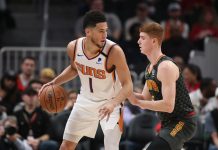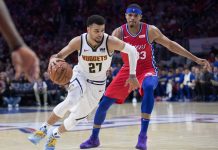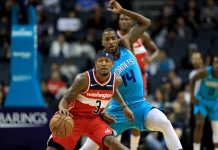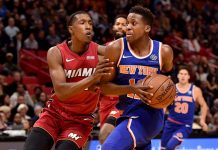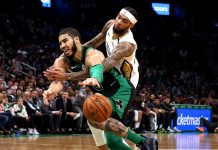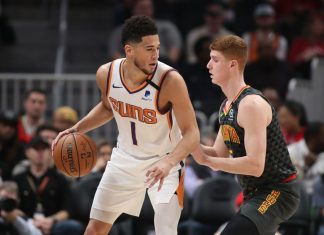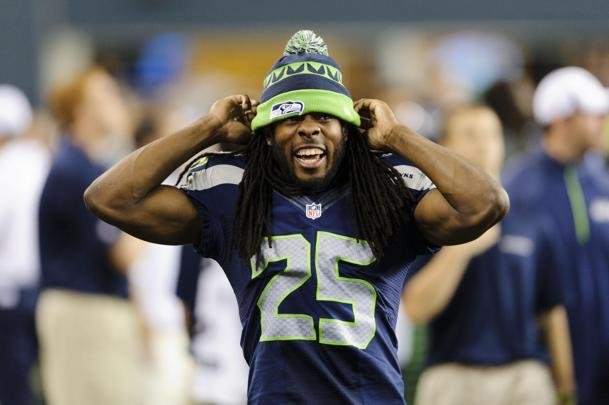SANTA CRUZ, Calif. (AP) – David Arseneault Jr. thought nothing of the email when it first appeared in his inbox.
The message from Dean Oliver, the Sacramento Kings’ director of player personnel and analytics, just seemed like another inquiry about the quirky system his father ran at tiny Grinnell College. Little did Arseneault know that the Kings had been targeting him as a candidate to coach their NBA Development League affiliate, the Reno Bighorns, for a unique basketball experiment.
”I called him, and he asked if I had interest in the job. I said, `The head coaching job?”’ Arseneault said, recalling the story during the D-League Showcase that concludes Monday night in Santa Cruz. ”He said, `Yes.’ I said, `Of course I have interest.’ I was shocked. I was a 28-year-old, part-time assistant coach at a Division III school in the middle of Iowa.”
Arseneault’s addition is the latest – and perhaps most unconventional – example of how NBA franchises are increasingly using their minor-league team as a testing ground for new ideas.
Since it started in 2001, the D-League has been focused on fostering and funneling talent to the NBA. That’s come mostly in the form of personnel, with the league’s most recent count tallying 139 players, 29 assistant coaches and two head coaches – Memphis’ Dave Joerger, and Utah’s Quin Snyder – currently on NBA rosters with D-League experience.
With 17 of 30 NBA franchises affiliated with one lower-tier club now, the expanding partnerships are allowing the D-League to become a melting pot for innovation.
Arseneault and his father, David Arseneault Sr., got the attention of the Kings in 2012 when Jack Taylor scored an NCAA-record 138 points in Grinnell’s 179-104 victory over Faith Baptist Bible. Arseneault Jr. was the de facto head coach the past few years, though his dad held the official title.
Now he has the Bighorns averaging 140 points per game in what has simply become known as The System. The general principles are to shoot within 12 seconds, apply a full-court pressure defense, substitute all five players every couple of minutes and attempt a ton of 3-pointers.
”Organized chaos,” he calls it.
Arseneault said he communicates with Sacramento’s front office daily, including Oliver, Kings general manager Pete D’Alessandro, assistant general manager Mike Bratz, and scouting coordinator and Bighorns assistant general manager Chris Gilbert.
”The ultimate goal is to provide the Sacramento Kings with something that they can use at the highest level of basketball,” Arseneault said.
The Kings, through a team spokesman, declined to comment on the system. But they’ve hardly been the only franchise taking a trial-and-error attitude with their D-League team.
Last year, the Houston Rockets hired Nevada Smith – then just 33 years old – from Division III Keystone College in La Plume, Pennsylvania, to lead their D-League affiliate, the Rio Grande Valley Vipers.
The Rockets, led by general manager Daryl Morey, were interested in Smith because of the way his team relied almost entirely on 3s and layups. They’ve used Rio Grande Valley, which attempted a league-high 45.4 shots per game from beyond the arc last season, to try out different schemes.
”I think we’ve had some creative minds,” Smith said. ”We have some other things we’ll do at some point in the season. Kind of saving them right now. You’ll have to wait and see. It’s kind of crazy, but it’s fun.”
The Golden State Warriors are fully invested in their D-League club, the Santa Cruz Warriors, who are owned and operated by the NBA franchise.
Santa Cruz coach Casey Hill spent this summer learning the system Steve Kerr implemented with Golden State. The Warriors, like many teams, want players to know the system at both levels so when they’re called up or sent down – as center Ognjen Kuzmic has been often this season – they know what to do.
”It’s a tool that we’re going to use, and we have used, to make our NBA team better,” Warriors general manager Bob Myers said.
With constant call-ups and contract buyouts, the ever-changing rosters in the D-League create the biggest challenges for teams trying to think outside the box.
Arseneault, for instance, was rotating more than 15 players at Grinnell. Now he usually has about 10 players with Reno, and they’re all competing for an NBA contract.
Arseneault, under the direction of the Kings, said he has made subtle adjustments every game. In a 129-119 win over the Westchester Knicks on Friday night, he had one group run the Grinnell system and another group run a traditional system to fit everyone’s skills.
Arseneault finds it all fascinating, mostly because he never expected the system his father adopted to ever win games – let alone at the professional level. It was just supposed to inject some fun into a small college team.
”I’ve told (the Kings), `Please come to me with any experiments you would like to see,”’ Arseneault said. ”If we can even provide them with one little thing, one little tweak, I would consider it a success.”
—
Antonio Gonzalez can be reached at: www.twitter.com/agonzalezAP
25% Bonus via Western Union


